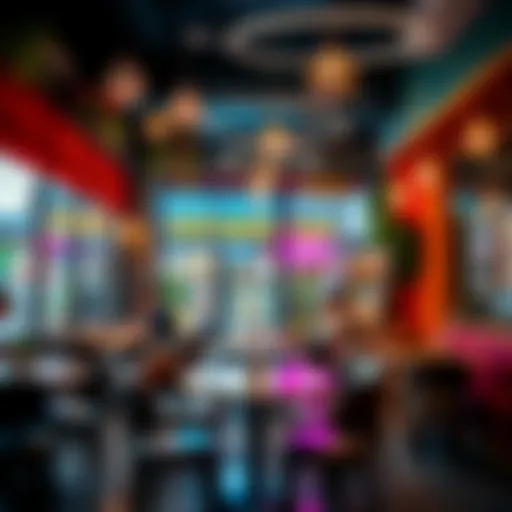Innovative Room Partitioning Solutions in Dubai
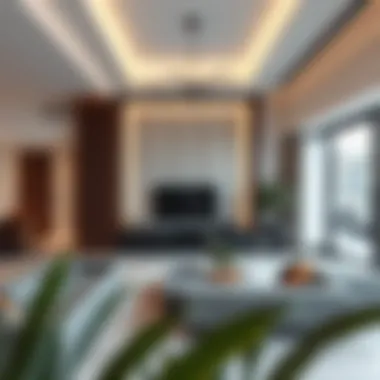

Intro
In an ever-evolving urban landscape like Dubai, the quest for functional and aesthetically pleasing living and working spaces is more crucial than ever. As the skyline of the city continues to rise, so does the need for innovative solutions that cater to diverse lifestyles and professional demands. Room partitioning, often viewed as a simple act of dividing spaces, encompasses much more than that. It’s about creating an environment that reflects personal style while maximizing utility. This article dives into the various options available for room partitioning in Dubai, exploring their practical applications, cultural influences, and the implications for both residential and commercial properties.
Understanding these partitioning solutions is essential, especially for investors and homebuyers poised to make decisions in this vibrant market. As we navigate through emerging trends and materials, we will unearth insights that will aid potential buyers in visualizing their investments. In doing so, we also aim to engage expatriates, agents, and developers who are intricately linked to Dubai’s unique property dynamics.
Let us begin our exploration with a closer look at the market insights surrounding room partitioning solutions.
Prelude to Room Partitioning in Dubai
Room partitioning has become an essential element in both residential and commercial spaces across Dubai. With the city's rapid growth and its blend of traditional and modern architecture, the ability to effectively manage space is paramount. Understanding how to utilize partitions can significantly alter the dynamics within a room, enhancing functionality while allowing for aesthetic appeal.
In Dubai, where real estate is a hot commodity, the configuration of living and working environments can make or break a deal. The right partitioning solution can create an inviting atmosphere in homes or establish professional workflows in offices. Here are some specifics to consider when diving into this fascinating topic:
- Cultural Relevance: The diverse population of Dubai incorporates various cultural elements, which heavily influence how spaces are designed and utilized. A partition can not only define physical spaces but also respect cultural norms, such as the need for privacy.
- Functionality Enhancement: Homebuyers and investors alike often seek flexible living arrangements. Moveable or adjustable partitions allow spaces to be rearranged according to specific needs — be it for hosting guests or creating a dedicated workspace within a larger area.
- Aesthetic Improvements: Beyond practical benefits, stylish room partitions can transform a plain environment into a visually striking one, resonating with Dubai's opulent style. They can serve as focal points that reflect personal taste or brand identity.
- Economic Considerations: For developers and investors, knowing the market trends around room partitions can provide valuable insights when designing new properties or renovations. They can target the growing need for multi-use spaces, appealing to both local residents and expatriates.
- Green Practices: Sustainability is no longer just a buzzword. Using eco-friendly materials in partitions can attract environmentally conscious buyers. Products made from sustainable resources not only reduce carbon footprints but can also often comply with Dubai’s evolving building regulations.
"Innovative space management reflects the characteristics of Dubai itself: dynamic and adaptable to change."
As we progress through this article, we'll examine historical context, diverse partition types, benefits, applications in residential and commercial settings, and critical considerations for implementing these solutions. Room partitioning isn't merely a trend; it is crucial for optimizing space, enhancing lifestyle, and ensuring that every inch of square footage is utilized effectively.
By navigating this landscape correctly, investors, homebuyers, and developers alike can uncover new opportunities that accurately cater to Dubai's unique market.
Historical Context of Space Management
Understanding the historical context of space management is crucial, especially in a rapidly developing city like Dubai. It provides insight into how previous generations have navigated their spatial limitations while molding contemporary practices around room partitioning. The strategic evolution of space layouts is often a reflection of cultural shifts, economic needs, and technological advancements. Thus, it lays the groundwork for any discussion on room partitioning solutions.
Evolution of Interior Design in Dubai
Over the decades, Dubai has transformed from a modest fishing village into a global hub for business and tourism. This transformation has significantly influenced the evolution of interior design. Early interiors were guided by traditional Emirati culture, focusing on communal living and functionality. With the influx of expatriates and global influences, this traditional style has gradually morphed into a more eclectic approach that embraces a vast range of aesthetics.
For example, in the late 20th century, homes predominantly featured open, unpartitioned spaces to enhance social interaction. However, as urban density grew and the demand for privacy in residential and commercial environments increased, designers began incorporating fixed and moveable partitions. This evolution highlights the significance of adapting to changing lifestyles, where the need for separate spaces within a single living area or business environment became a priority.
Cultural Influences on Space Layout
Cultural nuances significantly shape the layout of spaces in Dubai. The local population's customs and traditions stress the importance of hospitality, a factor that directly influences how spaces are partitioned. For instance, homes often integrate a majlis area, specifically designated for hosting guests. This particular space needs to be distinct and comfortable, fostering conversation while allowing for privacy.
Furthermore, expatriate communities, representing a myriad of cultures, have brought their design philosophies to Dubai. This melting pot of influences drives the need for versatile room partitioning solutions—solutions that not only separate spaces but also resonate with the cultural aesthetics of various nationalities. Designing spaces that cater to such diverse requirements can be challenging, yet it underscores the dynamic nature of interior design within the region.
In summary, the historical context provides a lens through which one can view the continuing evolution of space management in Dubai. It’s about transcending mere physical separation; it’s about fostering cultural dialogues and understanding the societal implications of our built environments. By acknowledging this history, stakeholders in the property market can better appreciate the decision-making processes involved in implementing effective room partitioning solutions.
Types of Room Partitions
When discussing room partitioning in Dubai, one must consider the diverse types of room partitions available. Each serves distinct purposes and has unique advantages. Understanding these options can empower investors, homebuyers, and developers to make informed decisions that suit their particular needs.
Fixed vs. Moveable Partitions
Fixed partitions are often considered a more permanent solution. They create a lasting division within a space, perfect for businesses needing privacy or different areas for employees. These partitions offer stability and are usually constructed using robust materials, ensuring they withstand daily wear and tear. However, the downside is their lack of flexibility. Once installed, altering fixed partitions can be costly and time-consuming.
Moveable partitions, on the other hand, cater to the dynamic nature of modern work and living environments. They allow for easy reconfiguration of spaces, which is essential for adaptability. Particularly in evolving commercial settings, being able to rearrange spaces helps in better utilization based on current needs. Nevertheless, moveable options can tend to be less soundproof than their fixed counterparts, and the initial investment in good quality movable systems can be significant.
Materials Used in Partitions
The choice of materials plays a pivotal role in the effectiveness of room partitions. Different materials come with varying benefits and drawbacks.
Glass
One notable option is glass. Glass partitions not only divide spaces but also maintain an open feel, allowing natural light to flow through. This is especially relevant in Dubai's climate, where brightness is abundant. The transparency of glass can make spaces look bigger and more inviting. However, it must be noted that glass partitions can be fragile and offer limited sound insulation. Additionally, if privacy is a concern, frosted glass or textured finishes can provide a solution while still preserving light flow.
Wood
Wood is another popular choice. Known for its warmth and aesthetic appeal, wood partitions can add a touch of class to any space. They are particularly favored in residential areas where coziness is a priority. Furthermore, wood is fairly easy to work with, allowing for various designs and finishes that can blend with existing decor. However, wood may be susceptible to moisture issues, especially in a humid environment like Dubai. Proper treatment and maintenance are necessary to ensure longevity.
Metal
Lastly, metal partitions stand out for their strength and durability. They are often used in commercial settings due to their ability to withstand heavy use. Metal can be designed in various ways, including perforated styles that offer an industrial yet chic look. One must consider, however, that metal can make spaces feel cooler and less inviting. It can also be prone to scratches, which means maintenance is a necessary aspect of choosing this material.
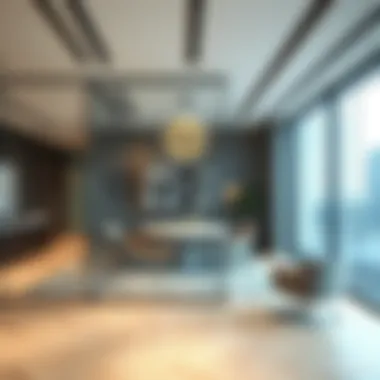

Design Aesthetics and Customization
Design aesthetics are a crucial consideration when selecting room partitions. It’s not just about dividing space but also about blending style with functionality. In Dubai, where design often reflects luxury and modernity, many individuals look for customizable solutions that mirror their unique aesthetics.
Customization allows for tailored designs that consider the existing décor while also enhancing the overall ambience of a space. For instance, incorporating patterns or textures into the partitions can complement or contrast with other elements in the room, like furniture or lighting fixtures.
Thus, as one navigates through the various room partition options available in Dubai, it's clear that understanding the types of partitions—be it fixed or movable, glass, wood, or metal—plays a vital role in crafting functional and appealing spaces that meet the needs of both residents and businesses.
Benefits of Using Room Partitions
Room partitions are increasingly becoming the unsung heroes of interior design, especially in a bustling hub like Dubai. They serve more than just a decorative purpose; they reshape how we experience space. Understanding these benefits can help residents and businesses make informed decisions about their environments.
Enhancing Privacy and Functionality
In a city where space is often at a premium, the importance of privacy can't be overstated. Room partitions provide a straightforward solution to creating private zones within open layouts. For instance, imagine a modern apartment with an open living area where families can easily find comfort without constantly bumping into each other. A sleek glass partition, for example, allows natural light to flow while still giving the sense of separation. Not only does this enhance personal space, but it also contributes to functionality, as different areas can serve distinct purposes—whether a reading nook or a workspace.
"Partitioning effectively transforms single rooms into multipurpose spaces, catering to both relaxation and productivity needs."
Maximizing Space Efficiency
Efficiency in space utilization is critical, especially in urban areas where every square foot counts. Partitions help in achieving this by allowing flexible arrangements. For instance, a common approach in Dubai is combining a living area and home office. Using a movable partition means that one can easily adjust the space according to their needs.
Here’s how these partitions maximize utility:
- Multi-use areas: Defines functions, letting you switch from leisure to work with ease.
- Aesthetic appeal: Customized designs can enhance the overall look while serving a purpose.
- Easy reconfiguration: Change layouts without permanent structural alterations, thus avoiding hefty renovation costs.
Creating Multi-functional Environments
Today’s lifestyles demand environments that can adapt to various needs without compromising comfort. Room partitions allow for this flexibility. In commercial spaces, for example, it is common to see partitions dividing a large area into several smaller, more functional zones suitable for meetings or collaborative work sessions.
In residential settings, think of an open-concept kitchen that can effortlessly transform into a dinner space with the addition of temporary partitions. With creative design, one can even incorporate storage solutions within partitions, combining functionality with style.
To summarize, the real beauty of room partitions lies in their ability to change how we experience space. They not only provide privacy but also create efficient, multi-functional environments tailored to the needs of both residential and commercial spaces in Dubai. Investors and end-users alike should weigh these benefits when considering their next layout decision.
For more information on the applications and trends of room partitioning, visit Wikipedia or Britannica.
Room Partitioning in Residential Spaces
Room partitioning in residential spaces is not just a trend; it has become a necessity in modern living. As homes in Dubai often reflect the hustle and bustle of urban life, effective space management is key. Homeowners seek to create environments that serve various purposes while maintaining a sense of comfort and style.
Using room partitions can significantly enhance the functionality of a living space. Here’s a detailed look at how partitions can effectively transform areas, providing specific benefits and considerations.
Dividing Living Areas
With open-plan designs being a staple in many Dubai homes, the ability to create distinct zones becomes crucial. For instance, many families desire a space where they can unwind, while also having an area for entertainment. Partitions can elegantly divide these living areas without completely cutting off the flow of light and interaction.
Consider these options for dividing living areas:
- Sliding Glass Walls: These offer flexibility. You can slide them open for a spacious feel or closed for privacy.
- Bookshelves: Not only do they serve as a partition, but they also provide storage and decoration.
- Fabric Panels: Soft materials create warmth and can easily be moved or adjusted.
Clients often appreciate how these partitions can reshape the overall aesthetic while being functional.
Home Office Integration
More homeowners in Dubai are tapping into the work-from-home culture, making the need for a dedicated workspace imperative. One major benefit of using room partitions in this context is the ability to create a quiet environment. This separation of work and relaxation spaces fosters productivity and minimizes distractions.
To establish a home office effectively, consider:
- Folding Partitions: These provide a temporary workspace that can be tucked away when not in use.
- Acoustic Panels: Investing in sound-dampening materials enhances focus, making them ideal for noisy homes.
- Work Nooks: Utilizing smaller areas and enclosing them can transform underused corners into efficient workspaces.
Creating this balance helps in maintaining professionalism while enjoying the comforts of home.
Children's Play Areas
For families, creating engaging and safe environments for children is a priority. Room partitions can transform a corner of the living area into a delightful play zone. This keeps toys organized and contained, offering children a dedicated space to explore and learn.
Options for children's play areas include:
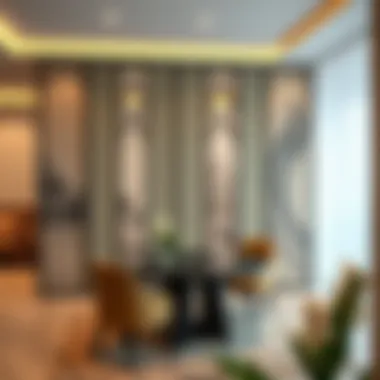

- Colorful Room Dividers: These can be fun and educational while clearly marking spaces.
- Interactive Walls: Custom partitions with chalkboards or whiteboards can stimulate creativity and imagination.
- Soft Play Zones: Partitioning with soft materials creates a safe area for younger kids to play, reducing potential hazards within the home.
Effective room partitioning not only enhances the usability of residential spaces but also supports the overall well-being of family life.
"Room partitioning is the art of maximizing utility while reflecting personal style, a skill that modern homeowners are learning to master."
Incorporating room partitions into residential designs in Dubai is increasingly recognized as a versatile solution that offers a blend of privacy, functionality, and aesthetic appeal. By adapting these techniques, homeowners can create tailored solutions that reflect their unique lifestyles while optimizing their living environments.
Applications of Room Partitions in Commercial Settings
In the bustling cities of the UAE, particularly Dubai, commercial spaces are evolving quickly. As businesses adapt to the changing landscape, the need for flexibility and efficient use of space is crucial. Room partitions provide various practical solutions tailored to diverse commercial needs. These applications enhance functionality, improve workflow, and promote the overall work environment, making them indispensable in today's business world.
Creating Collaborative Workspaces
In modern offices, collaboration is key. Creating collaborative workspaces means moving away from the rigid office layout of the past. Room partitions can separate areas while still promoting a sense of community. By using moveable partitions, companies can easily reconfigure spaces to foster teamwork and brainstorming sessions.
These partitions can come in a variety of materials, like glass, which allows natural light to flow through while providing a degree of separation. When teams can work together without feeling confined, productivity often increases. Additionally, flexible spaces can cater to various working styles, from quiet zones for focused tasks to open areas designed for group interaction.
Multi-purpose Meeting Rooms
Meeting rooms today need to be more than just a place to gather. They are becoming multi-purpose spaces that require effective partitioning to accommodate different activities. One common solution is using foldable or sliding partitions. This allows a single large room to be transformed into several smaller, intimate spaces suitable for presentations, workshops, or casual team huddles.
Proper partitioning also ensures that areas can be customized according to the occasion. For instance, an investor meeting might require a formal setup with enhanced audio-visual capabilities, while a team brainstorming session might benefit from a more relaxed layout. Ultimately, a well-partitioned meeting area means that businesses are ready for any situation, maximizing both the utility of their space and the comfort of their staff.
Customer Engagement Spaces
For retail and service-oriented businesses, customer engagement is crucial. Innovative room partitioning strategies can significantly enhance the customer experience. Interactive zones, for example, created with partitions, can encourage customer interaction while maintaining a pleasant shopping environment. With effective space design, businesses can create areas dedicated to product demonstrations or even consultation spaces for personalized services.
The aesthetics of these partitions also play a vital role. Using high-quality materials and attractive designs can contribute to the store's overall ambiance, making it inviting and engaging for customers. Moreover, the ability to adapt spaces quickly means businesses can respond to seasonal trends or promotional events more effectively, ensuring that they stay relevant in a fast-paced market.
In essence, the application of room partitions in commercial settings drives innovation, adaptability, and customer satisfaction. Properly structured spaces directly contribute to a business’s success and growth in today's competitive market.
In summary, employing strategic room partitioning in commercial settings redefines functionality and efficiency. Whether it's establishing collaborative workspaces, multi-purpose meeting rooms, or engaging customer spaces, these partitions offer the adaptability required for modern business dynamics.
Considerations for Implementing Partitions
When thinking about room partitioning solutions in Dubai, several crucial considerations come into play. It's easy to get swept away by the aesthetics and the myriad of options available, but there's more to it. From understanding building regulations to budgeting, all these elements come into play if one wants their project to be successful. This section highlights the nuances and offers insights into the essential aspects of effective partition implementation.
Building Regulations and Compliance
Before making any choices, it's imperative to familiarize oneself with the local building codes and regulations. Dubai has a strict framework that governs construction and interior alterations. Failing to comply can lead to unwanted delays or penalties, so it’s wise to consult professionals who understand these regulations.
Following are a few important regulations you might encounter:
- Adherence to safety codes, especially for fire-resistance ratings in wall materials
- Proper licensing and permits for installation of fixed partitions
- Compliance with environmental regulations regarding sustainable materials
Connecting with local authorities or consulting firms specializing in Dubai’s real estate can be an invaluable asset to navigate through these intricacies.
Budgeting for Room Partitions
When it comes to budgeting for room partitions, one must look beyond just the upfront costs. Proper financial planning is essential to avoid any nasty surprises once the work starts. Here’s a general breakdown to consider:
- Material Costs: Different materials come with varying price tags. Glass partitions, for instance, can be chic but might pinch the wallet. Wood and metal alternatives offer different balances of aesthetic appeal and cost.
- Installation Expenses: Labor costs can fluctuate, depending on the complexity of the project and the expertise of the hired professionals.
- Future Modifications: Allocating a portion of the budget for potential adjustments is wise. Needs can change over time, especially in a city like Dubai, where space usage must often adapt to evolving lifestyles.
By doing a thorough analysis of these factors, you can prepare a budget that’s both realistic and flexible.
Long-term Maintenance and Upkeep
Implementing room partitions isn't merely a set-and-forget solution. Maintenance is key, especially in a bustling city like Dubai, where environmental factors can accelerate wear and tear. Here are some maintenance considerations:
- Regular Inspections: Schedule periodic checks to ensure that partitions remain secure and functional. Any signs of damage should be addressed promptly to avoid larger issues later on.
- Cleaning Protocols: Depending on the materials chosen, different cleaning methods should be implemented. Glass partitions may need special cleaning products to maintain clarity, while wood may require specific treatments against humidity.
- Upgrades: As design preferences change, one may want to consider upgrading existing partitions. This not only helps keep up with trends but can also enhance the value of the space.
In summary, these considerations are not just tick boxes; they are integral to ensuring that your room partitioning solutions are both functional and sustainable in the unique context of Dubai.
"Understanding the local regulations and budgeting effectively can safeguard your investment in room partitioning."
Investors and residents alike must prioritize these elements to make informed decisions surpassing mere decorative intention.
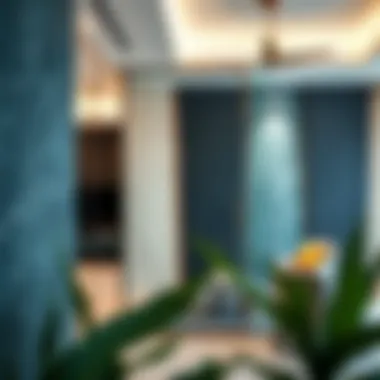

Sustainability in Partition Solutions
In today’s rapidly evolving urban landscape, the concept of sustainability takes center stage, especially in a diverse and dynamic city like Dubai. Room partitioning solutions are not just about creating physical boundaries in a space; they are also integral to the push for environmentally responsible living and working environments. Implementing sustainable practices in room partitioning can significantly reduce a building’s carbon footprint, enhance energy efficiency, and create healthier spaces for occupants.
The need for sustainable partitioning stems from the growing awareness of resources depletion and climate change. As Dubai positions itself as a global leader in innovation, the emphasis on sustainability in architecture and design becomes essential not just for compliance with regulations but as a market differentiator. By focusing on eco-friendly materials and energy-efficient practices, stakeholders in the real estate sector can contribute to a greener future while addressing the practical needs of investors, homebuyers, and businesses.
"Sustainable architecture is not just a trend; it's a commitment to a livable planet for future generations."
Eco-friendly Materials
When it comes to sustainable partitioning, the selection of materials plays a crucial role. Eco-friendly materials, such as reclaimed wood, bamboo, and recycled metal, are increasingly preferred in room partition designs. These materials not only minimize the reliance on virgin resources but also add a unique aesthetic touch to spaces.
- Reclaimed Wood: Using wood sourced from old buildings or discarded furniture reduces waste and gives a rustic feel to interiors, making it a favorite among designers.
- Bamboo: As a fast-growing plant that sequesters carbon, bamboo is an excellent option for partition construction. Its lightweight and durable nature ensure it stands the test of time.
- Recycled Metal: Utilizing repurposed metal for partitions aligns with sustainability goals while adding a modern edge to designs. It can also be combined with other materials for intricate designs.
- Low-VOC Paints: For finishing touches, using paints and finishes that are low in volatile organic compounds (VOCs) ensures better indoor air quality.
Choosing these kinds of materials not only supports sustainability initiatives but also appeals to the increasing number of consumers who value environmental integrity in their spaces.
Energy-efficient Design Practices
The integration of energy-efficient design practices in room partitioning extends far beyond simply selecting the right materials. It encompasses innovative methods that optimize natural light, regulate temperatures, and improve overall energy consumption within a space.
Here are some key strategies:
- Maximizing Natural Light: Utilizing clear glass partitions allows daylight to penetrate deeper into spaces, reducing reliance on artificial lighting. Daylight harvesting can lead to significant energy savings over time.
- Insulation Properties: Effective installation of partitions that provide insulation helps regulate indoor temperatures, reducing heating and cooling costs. Thoughtful design can enhance thermal comfort, thus benefiting both the environment and occupant well-being.
- Smart Technology Integration: Advances in technology offer solutions such as automated curtains and adaptive lighting systems that adjust based on natural light levels. This not only enhances user comfort but reduces energy wastage.
Incorporating these elements into room partitioning design not only showcases a commitment to sustainability but also creates practical, functional, and aesthetically pleasing environments for residents and businesses alike.
The intersection of sustainability and partition solutions in Dubai offers an exciting landscape for innovation. By prioritizing eco-friendly materials and energy-efficient design practices, stakeholders can harness the benefits of reduced costs, increased marketability, and a positive reputation in the community.
Future Trends in Room Partitioning
As we look toward the horizon of room partitioning solutions in Dubai, it becomes clear that innovation is the name of the game. The landscape is evolving, shaped by emerging technologies and shifting cultural norms. Understanding the forthcoming trends is essential for investors, homebuyers, and developers who want to stay ahead in this competitive market. As the needs of residents and businesses continue to change, so do the methods of space utilization, reflecting a desire for more flexible and dynamic environments.
Smart Partitioning Solutions
In a city that’s fast becoming a tech hub, smart partitioning solutions are paving the way for modern living. These solutions go beyond traditional designs, integrating technology to enhance functionality and user experience. For example, partitions equipped with sensors can automatically adjust based on occupancy, providing privacy when needed and openness when space is sufficient. Moreover, automated glass walls can transform a room from a conference setup into a casual lounge in a snap, catering to the needs of dynamic workplaces and events.
"Investing in smart partitioning not only optimizes space but also enhances the quality of the environment, making it more conducive to productivity and creativity."
Benefits of smart partitioning resonate through various aspects:
- Seamless Integration: Easily connect with smart home systems or office applications, offering users control at their fingertips.
- Data-Driven Decisions: Analyze usage patterns through built-in analytics, helping managers optimize layouts and configurations over time.
- Sustainability: Many smart solutions prioritize energy efficiency, utilizing technologies that reduce consumption without sacrificing comfort.
For investors, incorporating such technology can be a game changer. It adds significant value to properties, appealing to tech-savvy buyers and renters.
Adaptable Spaces for Modern Living
Adaptability is crucial in today’s fast-paced world, and this is especially true in Dubai's diverse living environments. The concept of adaptable spaces hinges on the ability to alter a room's purpose with minimal fuss. This is not just about aesthetics; it's about responding to the needs of occupants as they change.
For instance, a room designed to serve multiple functions—a child’s play area transforming into a home office or guest accommodation—fuels efficient living. This versatility is critical in urban settings where space is often at a premium.
Key elements of adaptable spaces include:
- Modular Design: Furniture and partitions that can be reconfigured easily, allowing residents to personalize their environments.
- Flexible Layouts: Open spaces that can be sectioned off or expanded depending on whether it’s a cozy family gathering or a large social event.
- Multi-purpose Functionality: Rooms equipped with storage solutions that facilitate transitions from one use to another, maintaining functionality without clutter.
As we adapt to changes in lifestyle, strategies for space utilization will demand a keen eye on how environments are designed and reshaped. For developers, understanding these trends is pivotal in creating homes that invite a more modern approach to living.
Staying ahead in the realm of room partitioning isn’t just about keeping up; it's about leadin the pack with foresight, understanding, and innovative solutions.
End
In the realm of room partitioning in Dubai, the significance of this topic cannot be overstated. As urban landscapes evolve, the way we utilize space increasingly reflects our diverse lifestyles and needs. This article encapsulates not just the practicality of room partitions but also their role as a canvas for creativity and innovation for both residential and commercial users.
First and foremost, understanding the benefits of room partitions is crucial for anyone looking to optimize their space. These structures can enhance privacy, allowing individuals to carve out personal havens within open environments. Likewise, they enable versatility, transforming a single room into multiple functional areas. For instance, a spacious studio can become a cozy home office by simply adding a movable partition. This adaptability proves invaluable in bustling cities like Dubai, where space may be at a premium.
Moreover, the sustainable practices in partitioning shouldn't be overlooked. As discussed, utilizing eco-friendly materials and energy-efficient design principles contributes significantly to a healthier environment and can improve long-term cost efficiency. With the rising focus on sustainability, exploring green partition options offers both ethical and economic advantages.
The article also highlights the critical considerations necessary before implementing partitions. From understanding building regulations to financial planning, these factors are essential in ensuring a successful installation. Knowledge of these elements can equip potential investors and homeowners with the tools necessary to make informed decisions that align with their goals and those of the broader community.
As we look ahead, trends in smart and adaptable partition solutions are reshaping the landscape. Technological advancements have led to innovative designs that not only serve functionality but create aesthetically pleasing environments. This intersection of utility and style is particularly appealing to expatriates and homebuyers seeking spaces that mirror their lifestyle choices.
In a city as dynamic as Dubai, the choice of how to partition spaces reflects the culture’s embrace of modernity while honoring traditional needs.
Ultimately, room partitioning in Dubai is more than just a means of separating space—it's about enhancing experiences, promoting flexibility, and embracing sustainability. As the demand for innovative solutions continues to grow, investing in smart room partitioning solutions offers both financial and aesthetic returns, making it a worthy consideration for any stakeholder in the Dubai property market.

